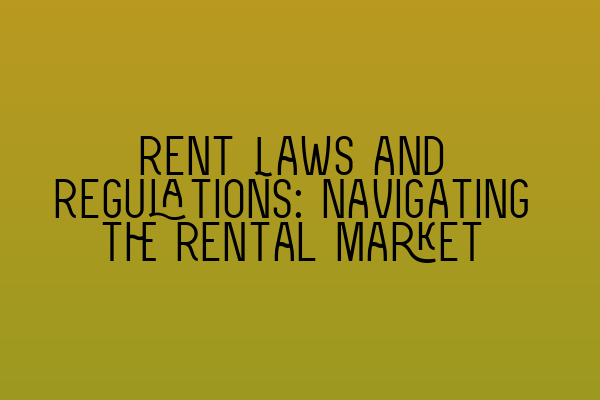Rent Laws and Regulations: Navigating the Rental Market
Renting a property can be a complex process, especially when it comes to understanding rent laws and regulations. As a tenant or landlord, it is crucial to have a clear understanding of your rights and responsibilities to ensure a smooth and harmonious rental experience. In this blog post, we will explore the key aspects of rent laws and regulations, providing you with the knowledge you need to navigate the rental market effectively.
Understanding Tenancy Agreements:
One of the first steps in entering the rental market is signing a tenancy agreement. This legally binding contract outlines the terms and conditions of the tenancy, including the rent amount, payment schedule, length of the tenancy, and responsibilities of both the landlord and tenant. Understanding the terms of the tenancy agreement is essential, as it sets the foundation for the landlord-tenant relationship. For a comprehensive understanding of tenancy agreements, check out our article on Understanding Contractual Capacity: Rights and Limitations.
Rent Control and Rent Increases:
Rent control is a significant aspect of rent laws that aims to protect tenants from exorbitant rent increases. In certain areas, there are laws in place to limit how much a landlord can increase the rent each year. These laws vary depending on the jurisdiction, and it is essential to familiarize yourself with the regulations specific to your location. In some cases, landlords may be permitted to increase the rent if they make significant improvements to the property. Understanding the rent control laws in your area will ensure that your rights as a tenant or landlord are protected.
Security Deposits and Repairs:
Security deposits are a common requirement when renting a property. They are intended to cover any potential damages or unpaid rent at the end of the tenancy. It is essential for both tenants and landlords to understand the rules surrounding security deposits, including the maximum amount that can be charged and the timeframe for returning the deposit after the end of the tenancy. Additionally, landlords have a legal obligation to maintain the property in a habitable condition and address any necessary repairs promptly. Tenants should be aware of their rights to request repairs and ensure that the landlord fulfills their responsibilities. For more information on this topic, you may find our article on Contract Law Reforms: An Analysis of Recent Changes helpful.
Evictions and Terminations:
Evictions and terminations are sometimes unavoidable in the rental market. It is crucial to understand the legal grounds for eviction and the procedures involved. Evictions can occur due to non-payment of rent, violation of lease terms, or other valid reasons, depending on the jurisdiction. Both tenants and landlords should be familiar with the eviction process to ensure their rights are protected. If you are interested in testing your knowledge on this topic, you can take our Interactive SQE Mock Tests for Contract Law: Test Your Knowledge.
Dispute Resolution and Mediation:
Rent disputes can arise between tenants and landlords, and it is advisable to resolve these issues through mediation if possible. Mediation provides an opportunity for both parties to come to a mutually agreeable solution with the help of a neutral third party. Understanding the dispute resolution and mediation options available in your jurisdiction can help you navigate any conflicts that may arise during your tenancy. For expert insights and guidance, consider joining our SQE Contract Law Webinars: Expert Insights and Guidance on this topic.
Conclusion:
Navigating the rental market can be a daunting task, but understanding rent laws and regulations is essential for both tenants and landlords. By educating yourself on tenancy agreements, rent control, security deposits, evictions, and dispute resolution, you can ensure a smooth and successful rental experience. If you would like further guidance on parties’ rights and responsibilities in a contract, we have an informative article on Parties in a Contract: Rights and Responsibilities available on our website.
Remember, staying informed and seeking professional advice when needed will help you navigate the rental market with confidence.
